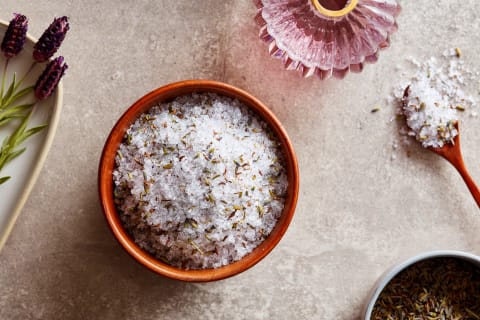Advertisement

A national study on sleep in the United States found that many Americans, while recognizing the importance of sleep, fail to prioritize daily sleeping habits in their everyday lives. With more demanding work hours and technology easily at our disposable, it's no wonder we're a sleep-deprived society. While everyone’s sleep needs vary depending on factors like individual needs and environment, sometimes the rhythm of our day-to-day lives can throw off our circadian rhythm, making it hard to reset it naturally. See how many hours a night leaves you feeling the best and how long you sleep when you don’t set the alarm clock. This will tell you what is right for you.
Meanwhile, inadequate sleep can cause a number of surprising problems beyond simply being tired, which is why many people are searching for natural ways to fall asleep and stay asleep, a few of which include herbs, nighttime rituals, and supplements like L-theanine. If you have one of the problems below, you're most likely getting enough sleep.
6 common symptoms of not getting enough sleep:
Fatigue and brain fog
Pain
Ever wondered why you feel achy after a night of rest? Sleep is where you make growth hormone and your body does tissue repair. Not enough sleep will often leave people feeling achy and out of sorts. Prioritize sleep to reduce pain and discomfort.
Risk of obesity
Inadequate sleep has been shown to be associated with an increased risk of obesity1, which is linked to a variety of other chronic illnesses and diseases. Sleep is also responsible for producing our growth hormone2. Growth hormone favors fat over muscle. It also slows aging, so even those wrinkles may mean you are not getting enough sleep.
Weak immune system
Catching colds that take forever to go away? Inadequate sleep is one of the most effective ways to immune suppress an animal, including humans. Seeking out ways to boost your immune system isn't just a good idea for your overall health but also for possibly identifying the root of your sleep habits.
Daytime sleepiness
Although people may normally be tired during the day, falling asleep in front of the TV while it's still light outside or having a tendency to fall asleep at the wheel can indicate the presence of sleep apnea—when the airway collapses during sleep and sleepers snore loudly. If you snore mostly when you’re lying on your back, try switching it up and sleeping on your side. A side benefit? This may also help high blood pressure come down.
Night sweats
This can indicate inadequate estrogen in a woman or testosterone in men. It can also reflect nighttime acid reflux, infections, or drops in blood sugar while sleeping. The latter suggests adrenal fatigue, which is likely present if you get "hangry" during the day. This can be helped by nutritional support. Taking a 1-ounce protein snack at bedtime, such as a hard-boiled egg or some meat or cheese, can also help balance blood sugars while you sleep.
Sometimes all it takes is a bit of rewiring of old habits to get back on the sleep track. Let's begin with the obvious—making enough time.
An important tip? Keep the things you enjoy, and cut loose the things that you don’t. This includes meetings that you dread, activities and people that suck your energy, and anything else that might lead you off track with your daily priorities.
A pre-sleep nightly routine?
Adults are really big children when it comes to sleep. Just as we know to establish a calming bedtime routine for our children, such as a princess movie or a bedtime story, make one for yourself. This signals your body that it's time to shift into sleep mode.

Looking to unwind before bed? Try an Epsom salt bath. Pour 2 cups of Epsom salts into a tub of hot water, and add a few drops of lavender oil. The magnesium salts will relax your muscles and correct an existing magnesium deficiency is you have one. Plus, the smell of lavender has been shown to further the relaxation.
Meanwhile, there is an extensive natural herbal and nutrient tool kit for sleep. Read on for a list of herbs for insomnia that will improve your sleep and enhance your sleep cycle.
Stock up on these 8 supplements that act as natural sleep aids:
Melatonin
For many people, melatonin tends to be the go-to supplement for enhanced sleep. If that doesn’t work for you, get a mixed immediate and sustained release 5-milligram tablet. This has the additional side benefit of decreasing nighttime acid reflux.
Valerian
A number of studies3 show numerous benefits linked to valerian and sleep, especially insomnia, deep sleep, and quality of sleep. While valerian might work in most cases, research found that around 10 percent of people can be energized by valerian. One way to test this out is by opting for valerian during the day instead of at night, as valerian does have a calming effect and can be used during the day for anxiety as well. It is nontoxic, even at high doses.
Lemon balm
Research has shown that lemon balm is similar to valerian in terms of its effects. A member of the mint family, lemon balm has the added benefit of having antiviral properties that decrease the risk of things such as cold sores.
Passionflower
Along with other herbs for anxiety, this flower is commonly used in South America for its calming effects. In fact, when people are nervous, their friends often tell them "go get a passionflower drink." It has the added benefit of being a muscle relaxant.
5-HTP
5-HTP is short for 5-hydroxytryptophan, which is the immediate precursor of serotonin from tryptophan. This takes six weeks to see the full effect, although some effect can be seen the same night. In addition to helping sleep, research shows that it helps pain and depression and can even contribute to weight loss.
L-theanine
L-theanine is an organic compound most popularly found in green tea leaves. It has been likened to "meditation in a capsule," stimulating the brain waves found in deep meditation.
Hops
The well-known ingredient in beer is responsible for the beverage's overall taste. The flower is said to be effective in treating insomnia since it acts as a muscle relaxant.
Bonus tip: Don't overlook CBD.
For more resistant insomnia, CBD has been associated with pain and anxiety. Marijuana has cannabinoids that are very helpful for these. But you don’t have to get arrested or be a zombie to get a good night's sleep. Similar benefits can be obtained from hemp oil, taking 10 to 50 milligrams of CBD at bedtime. This is available legally over the counter, but be sure to look for a hemp oil that is 20 percent CBD. Although there are many good brands out there, this is a case of buyer beware.
Oftentimes, you'll find a combination of the herbs mentioned above in capsules targeting insomnia (lemon balm, valerian, and hops, for example), but as always, be sure to consult with your practitioner on the best plan for your needs.
There are a ton of ways to treat insomnia, naturally. Try these nighttime beverages for amazing sleep.
